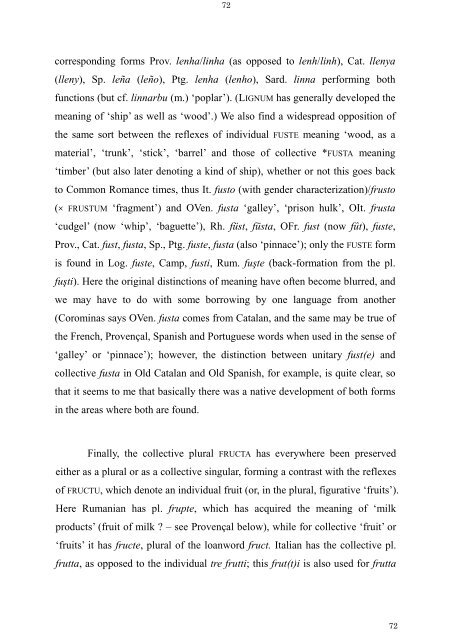The Latin Neuter Plurals in Romance - Page ON
The Latin Neuter Plurals in Romance - Page ON
The Latin Neuter Plurals in Romance - Page ON
You also want an ePaper? Increase the reach of your titles
YUMPU automatically turns print PDFs into web optimized ePapers that Google loves.
72<br />
correspond<strong>in</strong>g forms Prov. lenha/l<strong>in</strong>ha (as opposed to lenh/l<strong>in</strong>h), Cat. llenya<br />
(lleny), Sp. leña (leño), Ptg. lenha (lenho), Sard. l<strong>in</strong>na perform<strong>in</strong>g both<br />
functions (but cf. l<strong>in</strong>narbu (m.) ‘poplar’). (LIGNUM has generally developed the<br />
mean<strong>in</strong>g of ‘ship’ as well as ‘wood’.) We also f<strong>in</strong>d a widespread opposition of<br />
the same sort between the reflexes of <strong>in</strong>dividual FUSTE mean<strong>in</strong>g ‘wood, as a<br />
material’, ‘trunk’, ‘stick’, ‘barrel’ and those of collective *FUSTA mean<strong>in</strong>g<br />
‘timber’ (but also later denot<strong>in</strong>g a k<strong>in</strong>d of ship), whether or not this goes back<br />
to Common <strong>Romance</strong> times, thus It. fusto (with gender characterization)/frusto<br />
(× FRUSTUM ‘fragment’) and OVen. fusta ‘galley’, ‘prison hulk’, OIt. frusta<br />
‘cudgel’ (now ‘whip’, ‘baguette’), Rh. füst, füsta, OFr. fust (now fût), fuste,<br />
Prov., Cat. fust, fusta, Sp., Ptg. fuste, fusta (also ‘p<strong>in</strong>nace’); only the FUSTE form<br />
is found <strong>in</strong> Log. fuste, Camp, fusti, Rum. fuşte (back-formation from the pl.<br />
fuşti). Here the orig<strong>in</strong>al dist<strong>in</strong>ctions of mean<strong>in</strong>g have often become blurred, and<br />
we may have to do with some borrow<strong>in</strong>g by one language from another<br />
(Corom<strong>in</strong>as says OVen. fusta comes from Catalan, and the same may be true of<br />
the French, Provençal, Spanish and Portuguese words when used <strong>in</strong> the sense of<br />
‘galley’ or ‘p<strong>in</strong>nace’); however, the dist<strong>in</strong>ction between unitary fust(e) and<br />
collective fusta <strong>in</strong> Old Catalan and Old Spanish, for example, is quite clear, so<br />
that it seems to me that basically there was a native development of both forms<br />
<strong>in</strong> the areas where both are found.<br />
F<strong>in</strong>ally, the collective plural FRUCTA has everywhere been preserved<br />
either as a plural or as a collective s<strong>in</strong>gular, form<strong>in</strong>g a contrast with the reflexes<br />
of FRUCTU, which denote an <strong>in</strong>dividual fruit (or, <strong>in</strong> the plural, figurative ‘fruits’).<br />
Here Rumanian has pl. frupte, which has acquired the mean<strong>in</strong>g of ‘milk<br />
products’ (fruit of milk ? – see Provençal below), while for collective ‘fruit’ or<br />
‘fruits’ it has fructe, plural of the loanword fruct. Italian has the collective pl.<br />
frutta, as opposed to the <strong>in</strong>dividual tre frutti; this frut(t)i is also used for frutta<br />
72









